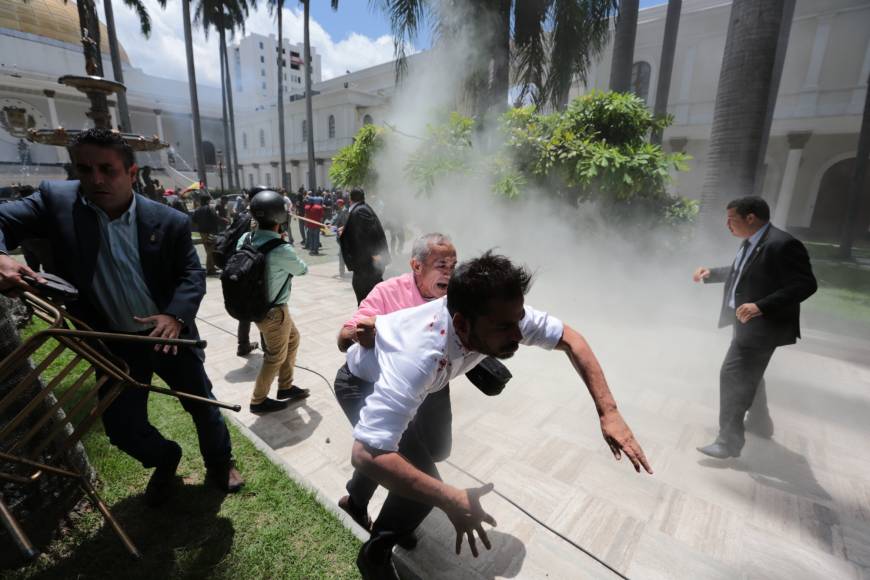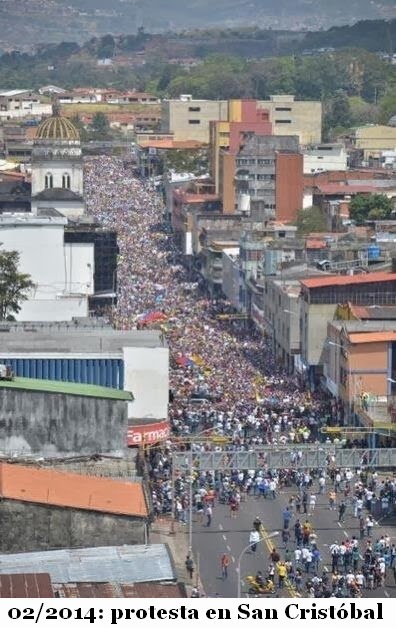Bolivarian Process (Cont’d)
Shared Article from The Japan Times
Maduro-backing militias storm Caracas congress, rough up opposit…
Pro-government militias wielding wooden sticks and metal bars stormed congress on Wednesday, attacking opposition lawmakers during a special session c…
japantimes.co.jp
CARACAS – Pro-government militias wielding wooden sticks and metal bars stormed congress on Wednesday, attacking opposition lawmakers during a special session coinciding with Venezuela's independence day.
Four lawmakers were injured and blood was splattered on the neoclassical legislature's white walls. One of them, Americo de Grazia, had to be removed in a stretcher while suffering from convulsions.
"This doesn't hurt as much as watching how every day how we lose a little bit more of our country," Armando Arias said from inside an ambulance as he was being treated for head wounds that spilled blood across his clothes.
The unprecedented attack, in plain view of national guardsmen assigned to protect the legislature, comes amid three months of often-violent confrontations between security forces and protesters who accuse the government of trying to establish a dictatorship by jailing foes, pushing aside the opposition-controlled legislature and rewriting the constitution to avoid fair elections.
. . . Later Maduro condemned the violence, but complained that the opposition doesn't do enough to control "terrorist attacks" committed against security forces by anti-government protesters.
— Maduro-backed militias storm Caracas congress, rough up opposition lawmakers
The Japan Times (July 6, 2017)
Shared Article from Reuters
Brazil bans tear gas exports to Venezuela due to violence: sourc…
Brazil's government has halted exports of tear gas for use in Venezuela due to violent repression of protests there, two sources familiar with the dec…
reuters.com
Brazil’s government has halted exports of tear gas for use in Venezuela due to violent repression of protests there, two sources familiar with the decision said on Monday, a move that added to the diplomatic isolation of Venezuela President Nicolas Maduro.
Brazil’s Defense Ministry and Ministry of Foreign Relations made the joint decision in response to appeals by the Venezuelan opposition, the sources said.
The Defense Ministry said on Friday that Rio de Janeiro-based Condor Tecnologias N?@c3;a3;o-Letais had not shipped tear gas canisters to Venezuela’s armed forces as negotiated in April, without giving a reason.
Condor confirmed on Friday that it had two active contracts in Venezuela, but declined to comment on specific shipments.
The company and ministries did not immediately respond to requests for comment on Monday.
The involvement of the Ministry of Foreign Relations underscores the role of diplomacy in the decision, as Brazil’s armed forces usually take responsibility for licensing the export of “controlled products” such as the stun grenades, rubber bullets, pepper spray and tear gas made by Condor.
“The (Brazilian) government decided to accept the opposition’s request because there’s a massacre in Venezuela,” said one of the sources, who requested anonymity to speak freely. The other source, a senior government official, said export of other crowd control equipment would also be denied.
— Brazil bans tear gas exports to Venezuela due to violence: sources
Reuters (June 19, 2017)
See also.
- GT 2016-05-15: State of Emergency
- GT 2016-05-13: Bolivarian Process
- Elsewhere 2015-09-02: Venezuelan farmers ordered to hand over produce to state
- Elsewhere 2014-08-26: Venezuela “to fingerprint shoppers”
- GT 2014-02-26: Translation of "One comrade from Mérida sounds off: Oh I've got the desire" (Viento sin Fronteras, in EL LIBERTARIO)
- GT 2014-02-23: Translation of "From Chile, a pitch for the foundation of anarcho-Madurism" (Armando Vergueiro, from El Libertario)
- GT 2014-02-22: Translation of "One comrade sounds off: What's happening now in Venezuela?" (Victor Camacho, in El Libertario)
- GT 2014-02-22: Translation of "Quick Overview of the Situation in Venezuela for the Curious and Ill-informed" (Rafael Uzcategui, El Libertario)
- GT 2014-02-22: Translation of Message from CDH-UCAB: on torture and cruel and inhuman treatment of the detainees from 12-F (Centro de DDHH de la UCAB, reprinted in EL LIBERTARIO)
- GT 2014-02-21: Translation of Report from San Cristobal, Tachira (Anonymous, reprinted by El Libertario)
- GT 2014-02-21: Translation of Caracas, 15-F: Impressions from the street (Humberto Decarli, in El Libertario)
- GT 2013-03-11: Hugo Chávez in 4 questions (Rafael Uzcátegui, from Peri?@c3;b3;dico El Libertario)
- GT 2008-03-12: Que se vayan todos.

